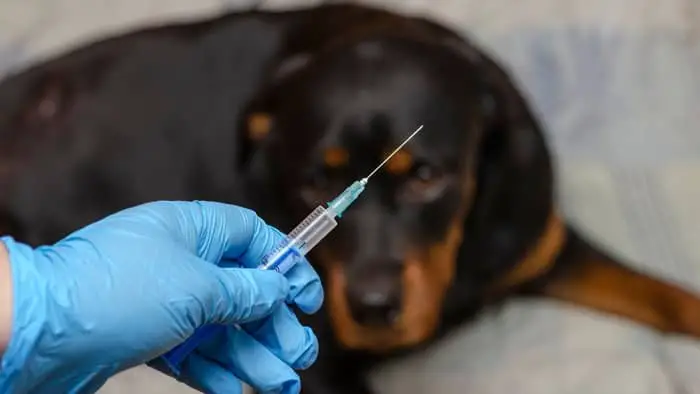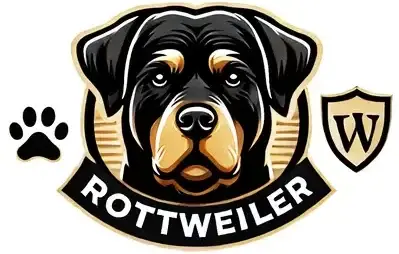Last Updated on April 24, 2024 by Dr. Julie
There is a type of bone cancer in Rottweilers known as Osteosarcoma, a primary bone cancer found in dogs.
This disease accounts for 95% of all bone tumours that dog breeds suffer from. This cancer starts from the bone and spreads elsewhere, weakening your dog eventually leading to death.
Besides the common osteosarcoma, other cancer types include fibrosarcoma, chondrosarcoma, and hemangiosarcoma.
The cause of osteosarcoma in dogs is not yet well known. This disease frequently occurs in large breed dogs, especially Rottweilers. Some dog breeds are more prone than others.
Table of Contents
Osteosarcoma In Dogs (Bone Cancer In Rottweilers)
Rottweilers are commonly affected by osteosarcoma at a rate of about 5 to 12%. These bone tumours can occur at any age; however, the average age of most diagnoses is about 8 years.
This is an aggressively malignant form of cancer that causes almost 100% mortality unless diagnosed and treated early enough. Successful treatment happens in only 10% of cases due to late diagnosis.
Osteosarcoma causes severe and progressive pain that can be difficult or impossible to treat at progressed stages. The genetic basis of this disease is not yet revealed, which makes it tough to deal with.
It has a familial pattern of appearance, and it seems hopeful to eliminate it through breeding from the lines that have not been affected. However, this has not yet been proved successful.
Osteosarcoma mostly affects the middle-aged large and giant breeds like Rotties.
Early detection and diagnosis are critical! Early symptoms to watch out for include leg pain and lameness. Should you notice any of these symptoms, don’t sit back; call your vet right away.
Osteosarcoma is a very painful and aggressive tumour; the sooner you report it, the higher the healing chances.
Lymphoma
Lymphoma or lymphosarcoma is also a type of cancer that affects Rottweilers more than other breeds.
This disease makes the body form an abnormal type of white blood cells known as lymphocytes. Because these white blood cells are found everywhere in the body, this cancer shows up almost anywhere and spreads fast.
This disease is a highly treatable form of cancer with an exceptional success rate in dogs that receive chemotherapy. Luckily, this disease can be diagnosed via a blood test, making it easy to diagnose early.
Ensure you take your furry friend to the vet for a blood test at least twice each year. Look out for swollen glands, sudden weight loss or laboured breathing and call your vet if you notice any of these signs.

Learn more about: My Dog Survived Parvo Now What? – A Deeper Study
Rottweiler Bone Cancer Symptoms
The symptoms of bone cancer in Rottweilers can be subtle, and they include:
- Loss of appetite and lethargy – you may notice your dog does want to do anything except lie down. If it were a very active dog, you would realize it doesn’t want to play.
- Breathing difficulties
- Swelling or a mass on the affected bone in the skull, jaw or ribs and lameness that doesn’t go away – these two signs are the most common symptoms to watch out for.
- Difficulty in eating if a tumour affects the jaw area.
- Neurologic signs, like seizures or a wobbly gait, if the tumour affects the skull or spinal tumours.
Diagnosing Osteosarcoma In Rottweilers
To diagnose this disease, most veterinarians follow these steps:
First, your vet performs a physical and orthopaedic examination then takes an X-ray to rule out other causes of lameness.
To obtain a clear diagnosis and determine the best treatment plan, all the marked areas on the x-ray will be biopsied.
Blood tests, urinalysis, chest X-rays or CT scans will be performed to assess your dog’s overall health. These tests also determine if cancer has spread across many parts of the body. In about 95% of dogs, the tumour will have already grown too much at the time of diagnosis.
Advanced CT imaging is recommended for osteosarcoma tumours of the limbs. It provides better information for the vet to determine if surgery is possible and its extent to achieve a successful outcome.
Treating Bone Cancer In Rottweilers
If the vet diagnoses osteosarcoma on your dog, they will develop a specialized treatment plan specifically fit for your dog. This will help your pet achieve the best possible outcome for successful treatment.
Besides the old treatment methods, new therapies and procedures are coming up with more alternative options that could help cure your dog.
- Surgery. This is the first most used option for treatment as long as it’s safe and viable.
- Amputation. Due to the aggressive nature of these cancerous tumours, the most effective treatment is tumour control by amputation of the affected limb. Though amputation does not settle well with most dog owners, most dogs do well after this procedure.
- Chemotherapy. Chemotherapy is a post-surgery procedure that helps control the regrowth of these cancerous cells to help control this disease as long as possible. Amputation is closely followed by chemotherapy to treat metastasis.
- Radiation. Radiation treatment is also available and effective for providing pain relief if surgery is not an option. This therapy treatment helps to relieve your dog’s cancer-related pain for a longer period.
Overall, the vets ensure that your pet is under adequate pain control. Be sure to discuss friendly pre-and post-operative therapy, pain management plans and any other questions you may need to ask your veterinarian.
Conclusion
Even as we have shared so passionately about bone cancer in dogs, we are only providing advice.
Use this post to educate and inform, not to try to diagnose and treat. For an accurate diagnosis, make an appointment with your vet and ask any questions you may have. For any medical advice, always talk to your vet as soon as you notice something odd about your furry friend.
Should you notice any of the signs and symptoms mentioned above or any confusing signs, contact your vet immediately and book an examination for your pet.
Your furry friend will thank you later for being so kind and treating it with care. Besides, they are man’s best friends we can’t neglect them!
If you have an ailing dog, we wish you a quick recovery!
